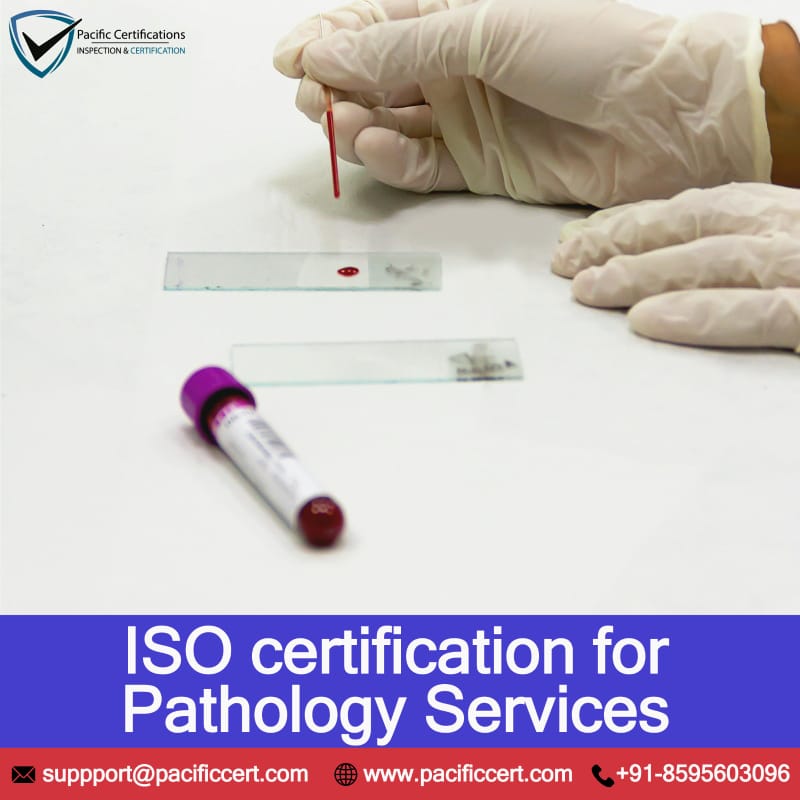ISO Certifications for Pathology Services, Requirements and Benefits

Introduction
Pathology services form the diagnostic backbone of modern healthcare through comprehensive tissue analysis, cytological screening, molecular diagnostics, immunohistochemistry testing, and clinical chemistry evaluations. These laboratories process millions of specimens annually while maintaining stringent accuracy standards across pre-analytical specimen handling, analytical testing protocols, and post-analytical result interpretation. Diagnostic accuracy remains paramount as studies demonstrate that up to 70% of laboratory errors originate in pre-analytical phases including specimen collection, patient identification, and sample transportation, while inappropriate test ordering and result interpretation contribute significantly to adverse patient outcomes.
ISO certifications equip pathology laboratories, hospital diagnostic departments, reference testing facilities, and molecular pathology centers with internationally recognized quality frameworks addressing diagnostic precision, patient safety, and regulatory compliance. Global regulatory authorities increasingly mandate accreditation to ISO 15189 for medical laboratories as evidence of technical competence and adherence to international best practices in clinical testing. Organizations implementing these standards systematically reduce diagnostic errors, enhance turnaround times, strengthen biohazard management, and demonstrate verifiable commitment to patient-centered care excellence.
"Diagnostic precision today determines treatment effectiveness tomorrow."
Quick Summary
ISO certifications provide pathology services with internationally recognized frameworks to manage laboratory quality and competence through ISO 15189, overall quality management through ISO 9001, occupational health and biosafety through ISO 45001, information security through ISO/IEC 27001, environmental management through ISO 14001, business continuity through ISO 22301, and risk management through ISO 31000.
For more information on how we can assist your pathology business with ISO certifications, contact us at [email protected].
Applicable ISO Standards for Pathology Services Businesses
Below are the most relevant ISO standards applicable to diagnostic pathology laboratories, hospital pathology departments, reference testing facilities, and molecular diagnostic centers:
ISO 15189:2012 - Medical Laboratories - Requirements for quality and competence
This pathology-specific standard addresses unique requirements for medical laboratories including pre-analytical patient preparation verification, analytical measurement uncertainty quantification, post-analytical result interpretation guidance, and point-of-care testing protocols, establishing comprehensive quality and competence frameworks that directly impact diagnostic accuracy and patient safety outcomes.
ISO 17025:2017 - Testing and Calibration laboratories
Establishes technical competence requirements for pathology testing procedures, equipment calibration protocols for microscopes and analytical instruments, measurement traceability for quantitative assays, proficiency testing participation, and method validation documentation ensuring diagnostic test reliability and reproducibility.
ISO/IEC 27001:2022 – Information Security Management Systems
Pathology services managing extensive patient health information, diagnostic test results, genetic data, digital pathology images, and electronic medical record integrations require robust cybersecurity frameworks protecting confidential medical information from breaches, ensuring regulatory compliance with international data protection standards, and maintaining diagnostic data integrity throughout digital transformation initiatives.
ISO 45001:2018 – Occupational Health and Safety Management Systems
Addresses critical biohazard exposures in pathology environments including infectious agent handling during tissue processing, chemical exposures from fixatives and staining reagents, ergonomic risks from microscopy work, sharps injuries during specimen preparation, and biological waste management aligned with WHO Laboratory Biosafety Manual recommendations.
ISO 14001:2015 - Environmental Management Systems
Manages environmental impacts from pathological waste disposal including formalin-fixed tissues, chemical reagents, biological specimens, sharps containers, and hazardous waste streams requiring specialized disposal protocols while promoting resource efficiency across laboratory operations.
ISO 13485:2016 - Medical devices - Quality Management Systems
ISO 13485 is particularly relevant for pathology laboratories involved in the design, development, production, installation, and servicing of medical devices. This standard ensures that laboratories maintain a quality management system that meets regulatory requirements for medical devices.
Click here to find out more applicable standards to your industry
What are the Requirements of ISO Certifications for Pathology Services Businesses?
Pathology laboratories seeking ISO certification must establish and maintain documented policies, procedures, and records aligned with the selected ISO standards. Key requirements include the following:
ISO 15189:2022 – Medical Laboratories
Define laboratory organization structure with clearly identified laboratory director responsibilities, quality manager authorities, and personnel competence requirements including pathologists, medical laboratory scientists, and cytotechnologists
Implement comprehensive pre-analytical controls addressing test requisition appropriateness, patient identification verification, specimen collection procedures, transportation conditions, and sample acceptance criteria preventing diagnostic errors
Establish analytical quality assurance programs including internal quality control for each testing procedure, external quality assessment participation, measurement uncertainty evaluation, and method validation documentation
Control post-analytical processes ensuring timely result reporting, critical value notification protocols, result interpretation guidance aligned with clinical contexts, and consultation availability for clinicians
Maintain equipment management systems covering calibration schedules for microscopes and analytical instruments, preventive maintenance records, performance verification documentation, and environmental monitoring for temperature-sensitive reagents
Conduct risk assessments throughout the total testing process identifying patient safety hazards, implementing mitigation controls, and documenting risk acceptance decisions following ISO 22367 principles
ISO 9001:2015 – Quality Management Systems
Define quality objectives for turnaround time performance, diagnostic accuracy rates, customer satisfaction metrics, and specimen rejection frequencies
Implement process controls spanning patient registration, specimen accessioning, diagnostic testing workflows, result verification, and report distribution
Establish supplier qualification procedures for reagent manufacturers, equipment vendors, reference laboratory partners, and consumables providers
Conduct management reviews evaluating quality indicators, corrective action effectiveness, resource adequacy, and strategic quality improvement initiatives
Maintain nonconformity management systems addressing specimen processing errors, incorrect results, transcription mistakes, and delayed reporting incidents
ISO/IEC 27001:2022 – Information Security Management Systems
Assess information security risks affecting laboratory information systems, digital pathology platforms, patient databases, and electronic result transmission channels
Implement access controls restricting patient information visibility based on role requirements and clinical necessity principles
Establish data encryption protocols for pathology reports, genetic testing results, and digital slide images transmitted electronically
Define backup procedures ensuring diagnostic data recovery, business continuity, and protection against ransomware attacks or system failures
Conduct security awareness training addressing phishing threats, password management, mobile device security, and confidential information handling
Monitor network security through intrusion detection, vulnerability scanning, and audit logging for unauthorized access attempts
ISO 45001:2018 – Occupational Health and Safety Management Systems
Identify workplace hazards including biological agent exposures during autopsy procedures and tissue processing, chemical exposures from formalin fixation and staining reagents, sharps injuries from microtomy and specimen handling, and ergonomic risks from prolonged microscopy
Provide personal protective equipment including laboratory coats, gloves, face shields for splash protection, respirators for aerosol-generating procedures, and biosafety cabinets for infectious specimen handling
Establish biosafety protocols aligned with WHO Laboratory Biosafety Manual guidelines addressing risk group classification, containment measures, and decontamination procedures
Conduct occupational health surveillance programs including hepatitis B vaccination, tuberculosis screening, chemical exposure monitoring, and injury reporting systems
Implement waste management procedures for pathological specimens, sharps disposal, chemical waste segregation, and biohazardous material treatment before disposal
Tip: Integrate ISO 15189 medical laboratory requirements directly into ISO 9001 quality management frameworks to create unified documentation systems that satisfy both standards while reducing redundancy and streamlining audit processes.
For more information on how we can assist your pathology business with ISO certifications, contact us at [email protected].
What are the Benefits of ISO Certifications for Pathology Services Businesses?
ISO certifications deliver substantial operational and strategic advantages for pathology laboratories, enhancing diagnostic reliability, regulatory standing, and market competitiveness; listed below are the key benefits for ISO standards applicable to diagnostic pathology laboratories, hospital pathology departments, reference testing facilities, and molecular diagnostic centers.
Improved diagnostic accuracy through standardized specimen handling protocols, validated testing procedures, rigorous quality control programs, and systematic error reduction addressing pre-analytical, analytical, and post-analytical phases
Stronger regulatory compliance demonstrating adherence to international medical laboratory standards, facilitating accreditation processes, and meeting healthcare authority requirements for laboratory operation licenses
Enhanced patient safety by implementing risk management frameworks identifying potential harm scenarios, establishing mitigation controls, and continuously monitoring adverse events throughout the total testing process
Better turnaround time performance streamlining workflows from specimen receipt to result reporting, eliminating unnecessary process steps, and optimizing resource allocation for urgent cancer diagnoses and critical care testing
Reduced diagnostic errors systematically addressing specimen misidentification, inappropriate test ordering, result interpretation failures, and communication breakdowns that contribute to adverse patient outcomes
Higher clinician confidence building trust through internationally recognized accreditation, reliable test results, appropriate reference intervals, and accessible pathologist consultation for complex diagnostic challenges
Greater market competitiveness differentiating laboratories from non-accredited competitors, facilitating contracts with healthcare networks, insurance providers, and pharmaceutical research organizations requiring ISO compliance
Streamlined digital transformation establishing quality frameworks supporting telepathology implementation, digital slide scanning, artificial intelligence integration, and secure cross-border consultation platforms
Improved employee safety protecting laboratory personnel from biological hazards, chemical exposures, ergonomic injuries, and occupational health risks through systematic biosafety management
The global pathology services market reached approximately USD 18.8 billion and is projected to expand to USD 36 billion over the coming decade at a compound annual growth rate of 6.7%, driven by rising chronic disease prevalence requiring diagnostic confirmation, aging populations increasing cancer screening demands, and expanding healthcare infrastructure across emerging economies. International regulatory frameworks increasingly mandate ISO 15189 accreditation as evidence of laboratory competence, with healthcare authorities emphasizing quality management systems, patient safety protocols, and technical proficiency as prerequisites for laboratory licensing and reimbursement eligibility.
Pathology laboratories implementing ISO management systems report 20-30% reductions in diagnostic errors, improved turnaround time performance, and enhanced operational efficiency across multi-site networks. Future growth will be accelerated by digital pathology adoption enabling remote diagnostics, artificial intelligence applications supporting diagnostic decision-making, molecular testing expansion for precision medicine, and telepathology platforms facilitating international consultations while creating new regulatory compliance and data security requirements.
How Pacific Certifications Can Help
Pacific Certifications, accredited by ABIS, acts as an independent certification body for pathology services businesses by conducting impartial audits against applicable ISO standards. Our role is to objectively assess whether documented management systems and laboratory diagnostic practices conform to international ISO requirements, based strictly on verifiable evidence and operational records.
We support pathology service providers through:
Independent certification audits conducted in accordance with ISO/IEC 17021 for medical laboratory quality, information security, and occupational health standards
Practical assessment of real pathology operations, specimen handling procedures, diagnostic testing workflows, quality control protocols, and biosafety controls
Clear audit reporting reflecting conformity status and certification decisions based on documented evidence, process observations, and competence verification
Internationally recognized ISO certification upon successful compliance with applicable standard requirements including ISO 15189 medical laboratory specifications
Surveillance and recertification audits to maintain certification validity and support continuous improvement initiatives across evolving diagnostic technologies
Multi-site certification programs for pathology networks operating hospital laboratories, reference testing facilities, and specialized molecular diagnostic centers across multiple geographic locations
If you need support with ISO certification for your pathology business, contact us at [email protected] or +91-8595603096.
Author: Ashish
Ready to get ISO certified?
Contact Pacific Certifications to begin your certification journey today!
Suggested Certifications –
Read more: Pacific Blogs

